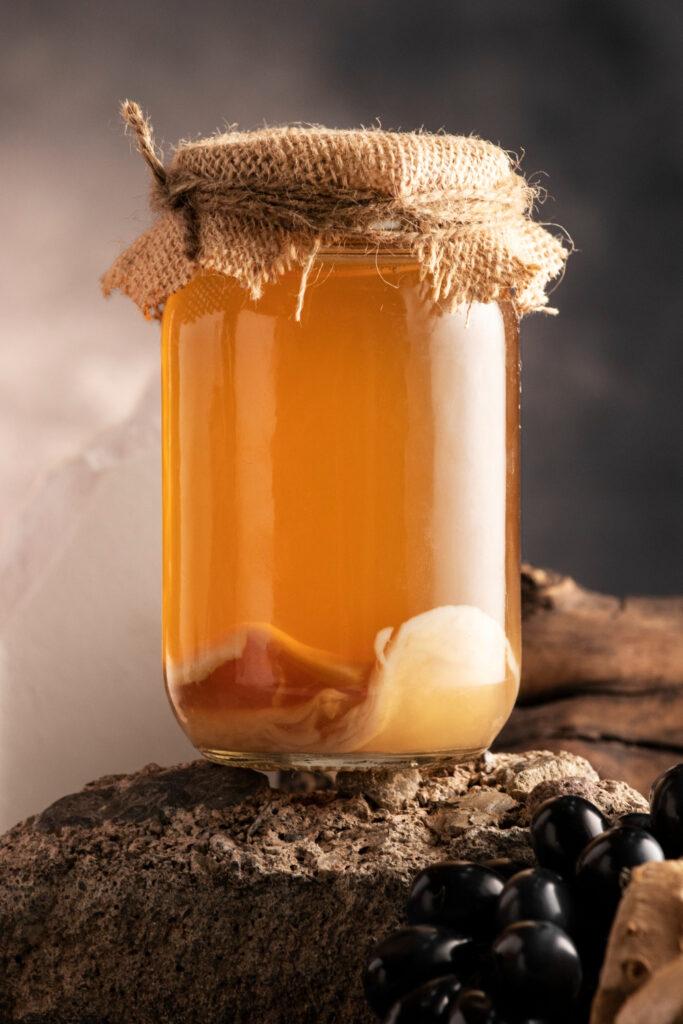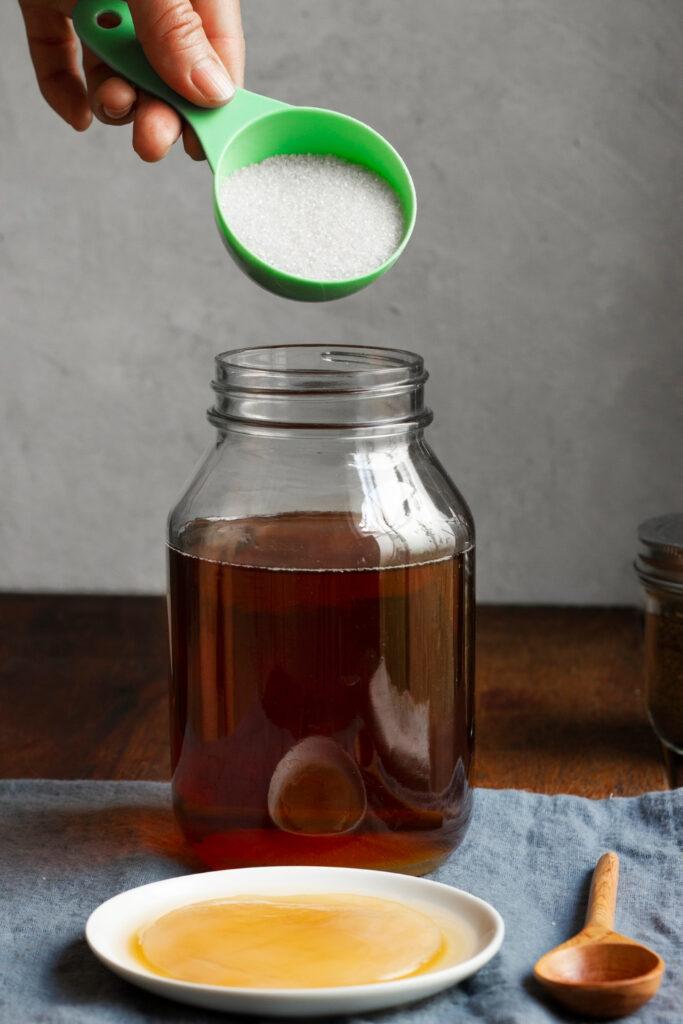Is Kombucha Good for You? Unraveling Its Fizzy Secrets
Is Kombucha Good For You?
Kombucha, a fascinating drink with a history rooted in ancient traditions, has gained immense popularity in recent years. Today we’re going to be exploring its nuances and discovering its impact on health. Let’s journey together into the realm of this effervescent tea and answer the burning question: Is kombucha good for you?
We are a participant in the Amazon Services LLC Associates Program, an affiliate advertising program designed to provide a means for us to earn fees by linking to Amazon.com and related sites. This post may contain affiliate links which means we may receive a commission, at no cost to you, for purchases made using our links. Please see my disclosure to learn more. Unless otherwise stated, all prices are in US$.
What Makes Kombucha Popular?
One of the reasons behind Kombucha’s popularity is its myriad of health benefits. From aiding digestion to potentially boosting immunity, this fermented tea has carved its niche in the wellness community.
Additionally, the diverse range of flavors available ensures there’s something for every palate.
Nutritional Value of Kombucha
Kombucha, often revered as a health elixir, boasts a remarkable nutritional profile that contributes to its growing popularity among wellness enthusiasts. Let’s delve into the key components that make this fermented tea a potential powerhouse of goodness.
Probiotics: The Gut’s Best Friend
At the heart of Kombucha’s nutritional value lies a robust colony of probiotics. These are live bacteria and yeast that promote a healthy balance of microorganisms in the gut. Probiotics play a pivotal role in supporting digestion, aiding nutrient absorption, and bolstering the immune system. For those seeking an alternative to traditional probiotic supplements, Kombucha provides a naturally fermented source that can contribute to maintaining gut health.
Organic Acids: The Flavorful Chemistry
The tangy taste of Kombucha is attributed to the presence of organic acids, such as acetic acid, gluconic acid, and lactic acid. These compounds not only enhance the flavor but also offer potential health benefits. Acetic acid, for instance, has antimicrobial properties, helping to inhibit the growth of harmful bacteria. Moreover, gluconic acid is believed to have detoxifying effects on the body, supporting the liver’s natural processes.

Antioxidants: Combating Free Radicals
Antioxidants are compounds that neutralize free radicals in the body, helping to mitigate oxidative stress and inflammation. Derived from tea leaves, this drink inherits the antioxidant properties of its base ingredient. This includes catechins, polyphenols, and flavonoids, which are known for their potential to combat cellular damage. Regular consumption of antioxidant-rich foods, like Kombucha, may contribute to overall well-being and the prevention of certain chronic diseases.
Vitamin B: Nourishing the Body
Kombucha is a natural source of various vitamin Bs, including B1 (thiamine), B2 (riboflavin), B3 (niacin), B6 (pyridoxine), B9 (folate), and B12 (cobalamin). These essential vitamins play crucial roles in energy metabolism, immune function, and overall cellular health. While the levels of B vitamins can vary depending on the tea used and fermentation process, it can be a valuable addition to a well-rounded diet for those looking to increase their B-vitamin intake.
Trace Elements: Supporting Vital Functions
Beyond its more prominent components, Kombucha contains trace elements such as iron, zinc, copper, and manganese. These minerals are essential for various physiological functions, including the formation of red blood cells, immune system support, and antioxidant defense. While the concentrations may not be as high as in certain foods, it contributes to the overall diversity of micronutrients in the diet.
Potential Health Risks
While Kombucha has gained popularity for its potential health benefits, it’s crucial to acknowledge and understand the potential risks associated with its consumption. Awareness of these risks can empower individuals to make informed choices and enjoy their fizzy tea responsibly.

Alcohol Content: A Surprising Element
One notable risk associated with Kombucha is its alcohol content. During the fermentation process, yeast converts sugars into alcohol and carbon dioxide. While commercially available Kombucha is regulated to contain less than 0.5% alcohol by volume (ABV), homemade brews may sometimes exceed this limit. It’s important for individuals sensitive to alcohol, including pregnant women and those with a history of alcohol-related issues, to exercise caution and choose low-alcohol or alcohol-free alternatives.
Allergic Reactions: A Minority Concern
Although rare, allergic reactions to Kombucha can occur. Some individuals may be sensitive to the components of the tea, the fermentation by-products, or added flavorings. Symptoms of an allergic reaction may include rash, itching, swelling, or difficulty breathing. If you have known allergies or experience any adverse effects, it’s advisable to consult with a healthcare professional and discontinue consumption.
Acidity: Consideration for Dental Health
The acidity of Kombucha, attributed to its organic acids, can be a concern for dental health. Regular consumption of acidic beverages may contribute to enamel erosion and tooth sensitivity. To mitigate this risk, it’s recommended to consume Kombucha in moderation, rinse the mouth with water after drinking, and maintain good oral hygiene practices.
Candida Overgrowth: Precaution for Certain Individuals
For individuals with compromised immune systems or those susceptible to fungal infections, the introduction of live cultures through Kombucha may pose a risk of exacerbating conditions like Candida overgrowth. While research on this topic is limited, it’s advisable for individuals with existing health concerns to consult with a healthcare professional before incorporating Kombucha into their diet.

Interactions with Medications: Caution Required
Kombucha’s active compounds, such as probiotics and organic acids, may interact with certain medications. Individuals taking medications for conditions like diabetes, blood pressure, or immune disorders should consult with their healthcare provider before regularly consuming Kombucha. This ensures there are no potential adverse interactions that could impact the effectiveness of medications.
Choosing the Right Kombucha
With the increasing availability of Kombucha in the market and the option to brew it at home, selecting the right type for your preferences and health needs requires careful consideration. Whether opting for store-bought varieties or venturing into the world of homebrewing, here are essential factors to guide you in making an informed choice.
Store-Bought vs. Homemade: Weighing Your Options
Store-Bought Kombucha:
- Convenience: Commercially available Kombucha offers convenience, with a variety of flavors and brands easily accessible in supermarkets and health food stores.
- Consistency: Established brands adhere to regulatory standards, ensuring a consistent alcohol content below 0.5% ABV, making them suitable for a broader audience.
Label Transparency: Pay attention to labels, ensuring the absence of artificial additives, excessive sugars, or unwanted preservatives.
Homemade Kombucha:
- Customization: Brewing at home allows for customization of flavors and experimentation with different tea bases and additives.
- Cost-Effective: While there is an initial investment in equipment, homebrewing can be cost-effective in the long run compared to frequent purchases of store-bought varieties.
- Quality Control: Homebrewers have control over the fermentation process, ingredients, and sugar levels, contributing to a personalized and potentially higher quality brew.
Reading Labels: Decoding the Information
Ingredients List:
- Tea Base: Look for Kombucha made with high-quality tea leaves, as the tea base significantly influences the final flavor.
- Sugar Content: Be mindful of the sugar content. While sugar is necessary for fermentation, excessive added sugars may counteract the potential health benefits.
Probiotic Content:
- Live Cultures: Choose Kombucha with a label indicating the presence of live cultures. Probiotics are a key component contributing to gut health.
Flavorings and Additives:
- Natural vs. Artificial: Opt for Kombucha with natural flavorings and avoid those with excessive artificial additives or preservatives.
Consider Your Preferences: Finding the Right Fit
Flavor Profiles:
- Exploration: Embrace the variety of flavors available, from classic to exotic blends, and experiment to discover your preferred taste.
Carbonation Level:
- Fizz Factor: Some prefer highly carbonated Kombucha, while others enjoy a milder effervescence. Explore different brands and homebrewing techniques to find your ideal carbonation level.
Exploring Local Options: Supporting Artisanal Brews
Local Breweries and Artisanal Brands:
- Community Impact: Explore options from local breweries or artisanal brands to support small businesses and experience unique, handcrafted flavors.
- Freshness: Local options may offer fresher products with a shorter supply chain, potentially enhancing the overall quality of the Kombucha.

Addressing Common Misconceptions
As Kombucha continues to gain popularity, it’s not uncommon for misconceptions to circulate about this fermented tea. Dispelling myths and clarifying these misconceptions is essential for individuals seeking accurate information about Kombucha. Let’s address some common misunderstandings surrounding this effervescent beverage.
Sugar Content: Debunking the Sweet Myth
- Myth: Kombucha is high in sugar, making it unsuitable for those watching their sugar intake.
- Truth: While sugar is initially added to feed the fermentation process, Kombucha undergoes a transformation during fermentation, resulting in a lower sugar content in the final product. Commercially available options often list the grams of sugar per serving on the label, helping consumers make informed choices based on their dietary preferences.
Alcohol Fermentation: Separating Fact from Fiction
- Myth: All Kombucha contains high levels of alcohol, posing risks for individuals, especially those avoiding alcohol.
- Truth: Commercially available Kombucha is regulated to contain less than 0.5% alcohol by volume (ABV), similar to the limits for non-alcoholic beverages. Homemade brews may vary, but understanding the fermentation process and following proper guidelines can help control alcohol levels. It’s crucial for individuals sensitive to alcohol to choose options with low or no alcohol content.
Allergic Reactions: Navigating Rare Incidents
- Myth: Kombucha commonly triggers allergic reactions due to its fermented nature.
- Truth: Allergic reactions are rare. Sensitivities might be to specific components like tea, flavorings, or by-products of fermentation. If you have known allergies, carefully read labels and start with small quantities to monitor your body’s response. In case of any adverse reactions, consult with a healthcare professional.
Probiotics: Managing Expectations
- Myth: All Kombucha brands provide a consistent and high quantity of probiotics.
- Truth: Probiotic content can vary between different brands and batches. Factors such as fermentation time, temperature, and specific strains used influence probiotic levels. While Kombucha contributes to gut health, it may not replace specialized probiotic supplements, and individual responses to probiotics can differ.
Detoxification Claims: Separating Hype from Reality
- Myth: Kombucha is a miracle detox drink, flushing toxins from the body.
- Truth: While Kombucha contains compounds with potential detoxifying properties, it’s essential to approach detox claims with a realistic perspective. The liver and kidneys are the primary organs responsible for detoxification, and Kombucha, as part of a balanced diet, may support overall wellness rather than serving as a sole detox solution.
Candida Concerns: Contextualizing Fungal Interaction
- Myth: Kombucha worsens Candida overgrowth due to its fungal nature.
- Truth: While Kombucha is a fermented product, the evidence linking it to Candida overgrowth is limited. Individuals with concerns about fungal infections should consult with a healthcare professional. The majority of people can enjoy it in moderation without adverse effects on gut health.
A Few Final Thoughts
The question of whether Kombucha is good for you is nuanced. Balancing the benefits and potential risks, Kombucha can be a valuable addition to a wellness-focused lifestyle. Embracing this effervescent tea with an open mind and understanding its impact can lead to a delightful and healthful journey.

The Big Book of Kombucha
Brewing, Flavoring, and Enjoying the Health Benefits of Fermented Tea
Brew your own kombucha at home! With more than 400 recipes, including 268 unique flavor combinations, you can get exactly the taste you want — for a fraction of the store-bought price. This complete guide, from the proprietors of Kombucha Kamp, shows you how to do it from start to finish, with illustrated step-by-step instructions and troubleshooting tips. The book also includes information on the many health benefits of kombucha, fascinating details of the drink’s history, and recipes for delicious foods and drinks you can make with kombucha (including some irresistible cocktails!).
Some Questions You Might Have
- Can Kombucha replace my daily coffee or tea?
While Kombucha offers a unique alternative, it’s essential to consider personal preferences and caffeine requirements. Some individuals find it a suitable replacement, while others enjoy it as a complementary beverage.
- Are there any side effects of drinking too much Kombucha?
Excessive consumption of Kombucha may lead to digestive discomfort for some individuals due to its probiotic nature. Moderation is key to enjoying its benefits without adverse effects.
- Can pregnant women safely consume Kombucha?
Pregnant women are advised to exercise caution with Kombucha due to its potential alcohol content and the variability in homemade brews. Consultation with a healthcare professional is recommended.
- How long does it take to brew Kombucha at home?
Homebrewing Kombucha typically takes 1 to 3 weeks, depending on factors like temperature and personal taste preferences. Patience is crucial for a successful brewing process.
- Is Kombucha suitable for individuals with lactose intolerance?
Yes, Kombucha is generally lactose-free as it undergoes fermentation. It can be a suitable option for individuals with lactose intolerance, providing a flavorful alternative to dairy-based beverages.





